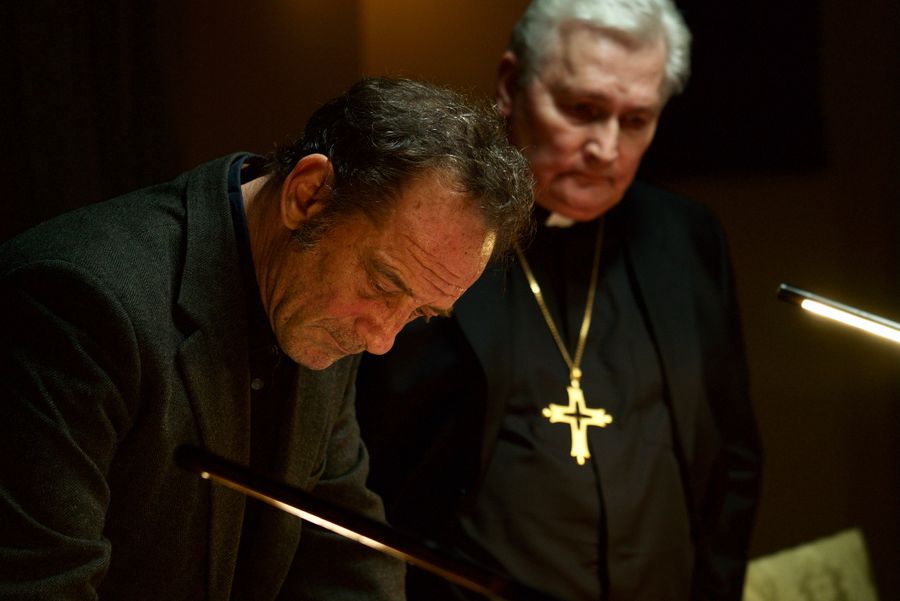Reviewed by Lee Hill
The Catholic Church has seen better days at the cinema. During the Golden Age of Hollywood in the 30s and 40s, The Church acted as gatekeeper and censor ensuring that both the Holy Spirit and Hays Code were affirmed. The clergy on film tended to come with a touch of the blarney a la Bing Crosby or as sympathetic, but ineffectual sounding boards like Karl Malden in On The Waterfront. More unorthodox or radical explorations of The Church, such as the work of Luis Bunuel or Robert Bresson, were relegated to film festivals and the art house Still every now and then faith would be explored with more than just good taste, but moral complexity in films like Fred Zinnemann’s A Nun’s Story or Alfred Hitchcock’s I Confess.
As the reverence for established religion was eroded further in the 60s and 70s, it was a sign of the times that the most devout films to emerge from the cultural shift were Roman Polanski’s Rosemary’s Baby and William Friedkin’s The Exorcist. In more recent years, as one scandal after another has tainted the ecclesiastical clout of Vatican and Co., we have had films like Priest (1996) and Spotlght (2015), which detailed the rot beneath the cassock without apology.
Still no matter how the Vatican has failed its followers, millions still believe. And unsurprisingly it is horror films (Hereditary is a recent example) that most effectively get the believer and heretic into the multiplex. More sober examinations of religious belief are few and far between, so it is to writer/director, Xavier Giannoli’s credit, that he makes the attempt in L’Apparition.

Vincent Lindon plays Jacques, a war correspondent recovering from seeing his photographer partner die on an assignment. He is contacted by the Vatican, who are investigating the case of a young French woman, Anna (Galatea Bellugi), who claims she saw the Virgin Mary. The Vatican believes Jacques’ reputation for journalistic rigor and agnosticism will add credibility as a special team determines whether the case can be given “apparition” status or is a hoax.
In desperate need of work as therapy, Jacques travels to a remote town in the foothills of Southern France, a bucolic setting now being mobbed by tourists as well as true believers. He joins a team that includes a theologian, psychiatrist (an underused Elina Lowensohn, known for her work with Hal Hartley and Michael Almereyda) and scholarly priest. They experience resistance from Father Borrodine (Patrick d’Assumcao), keen to preserve a semblance of sacred mystery among his flock and a Vatican PR type Anton (Anatole Taubman), who hopes the outcome can be spun in the Church’s favour.
L’Apparition does a good job of showing us the resources of The Church in action – its huge library in Rome, the academic pedigree of its clergy and ability to use modern media to its own ends. However, the documentary verisimilitude is anchored to a script where little happens until the last half hour of the film. Neither the title cards that break up the narrative, the stately pacing or Lindon’s low-key performance – he seems to suffer not so much from PTSD as a need for a very strong coffee – achieve much in the way of drama or emotional impact. Giannoli and his co-writers never quite strike the balance between respect for the Church’s traditions, history and global pull and the secular, scientific detachment that Jacques and his fellow investigators represent.

While Jacques’ interviews with Anna point towards a moral or spiritual reawakening on his part, the film ultimately tries to tie up loose ends with a twist regarding Anna’s testimony. This third act revelation doesn’t achieve the ambiguity the filmmakers are aiming for and it is likely a lot of post-film discussions will revolve around the film’s narrative failures rather than philosophical implications. So not unlike the investigators in L’Apparition, the viewer is left with little to work with. While the film is ambitious, it is also very safe filmmaking. This restraint may garner L’Apparition a non-traditional audience, but it makes for unsatisfying drama and theological enquiry.
Screenplay by Xavier Giannoli with Jacques Fieschi and Marcia Romano.
Starring Vincent Lindon, Galatea Bellugi, Patrick d’Assumcao, Elina Lowensohn and Anatole Taubman.

Comments are closed, but trackbacks and pingbacks are open.